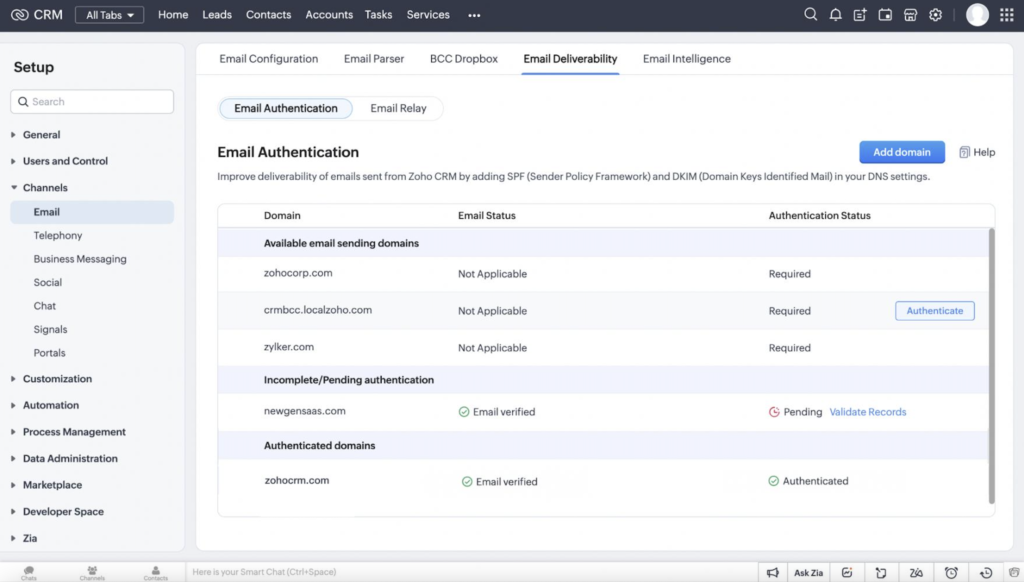Important update to Zoho CRM's email deliverability
Zoho recently informed us about the important update they are making to Zoho CRM’s email deliverability. The current email system supports users in sending nearly 100 million emails per month via Zoho CRM. These include mass emails, workflows, 1-to-1 sales communication, meetings, and more. However, Zoho are planning to enhance their email systems with some in-product changes to improve the delivery rate of their users’ emails without any bounces. Additionally, these will ensure their email-sending IPs and domains have the best sender reputation.
We see this as a crucial update to Zoho’s email features, as it results in higher deliverability and higher conversion rates for your business communications and sales pipelines. To achieve this, Zoho are working on ensuring that all emails sent from Zoho CRM are sent only from email addresses connected to authenticated domains.

What is domain authentication?
Domain authentication is a process where our systems recognise that users own the domains connected to the email addresses from which they send emails. By adding the necessary SPF and DKIM files to their domain’s DNS settings, their email-sending domains will be successfully authenticated. Zoho then provide this authentication information to the recipients’ inbox providers every time they send an email. This way, inbox providers like Gmail, Outlook, etc., can confidently recognise that the emails they receive from Zoho CRM are genuinely from the senders they claim to be.
How with the planned changes ensure domain authentication?
Email addresses from public domains will automatically be re-formatted starting April 1, 2023.
What does that mean? Lets look at an example:
A user sends emails using emailaddress@gmail.com via Zoho CRM. However, the recipients will see the emails in the inboxes as being sent from emailaddress.gmail.com@zohocrm-2380248-sdud09.com.
Why? This change disallows the use of public email providers. These are prone to extreme scrutiny from inbox providers and have poor deliverability rates. These impact Zoho’s sender reputation and the success of your outgoing messages. They are making this change to act faster against rogue users who sign up for Zoho CRM free trials using addresses from public email providers to send spam emails through their systems. By routing their emails from Zoho’s authenticated domains, Zoho can easily identify any bad sources that damage Zoho’s sender reputation.
Email addresses from non-authenticated domains will also be automatically re- formatted starting April 1, 2023.
Zoho are also mandating domain authentication for all email-sending domains. Even if users have been sending emails through non-authenticated email addresses, starting April 1, email addresses will automatically be reformatted unless your domains are authenticated.
What does that mean? Lets look at an example:
A user sends emails from sales@austarkitchens.com. However, recipients will see the emails in their inboxes as being sent from sales.austarkitchens.com@zohocrm-2380248-sdus09.com. This assumes austarkitchens.com has not been authenticated by April 1, 2023.
Zoho are making this mandate to improve Zoho CRM’s sender reputation and meet the highest industry standards. As they use a shared back-end infrastructure to send all Zoho user’s emails, it’s essential that customers with authenticated domains and healthy email-sending practices are protected from the damage caused by accounts using non-authenticated domains to send emails.
What do I do to resolve this change to Zoho CRM’s email deliverability?
We would like to emphasise that unless all domains are authenticated, this will affect many existing emails, workflows, and business communication that our customers have already set up. There will be multiple in-product reminders and alerts to inform all administrators. Furthermore, we will reach out to our customers to ensure all domains are authenticated.
Finally, Zoho have updated the current Email Authentication page available via Setup > Channels > Email > Email Deliverability > Email Authentication. This update displays all current email-sending domains based on the email addresses of users added to the organisation’s Zoho CRM account, plus all the organisation emails added to the account. Domains are also categorised to show the ones that have been authenticated and those that are pending authentication.
Read more: Email Authentication | Zoho CRM Help
To understand email deliverability and to learn about best practices, please review Zoho’s documentation here: Email Deliverability and Best Practices
Get in touch if you have any questions.
